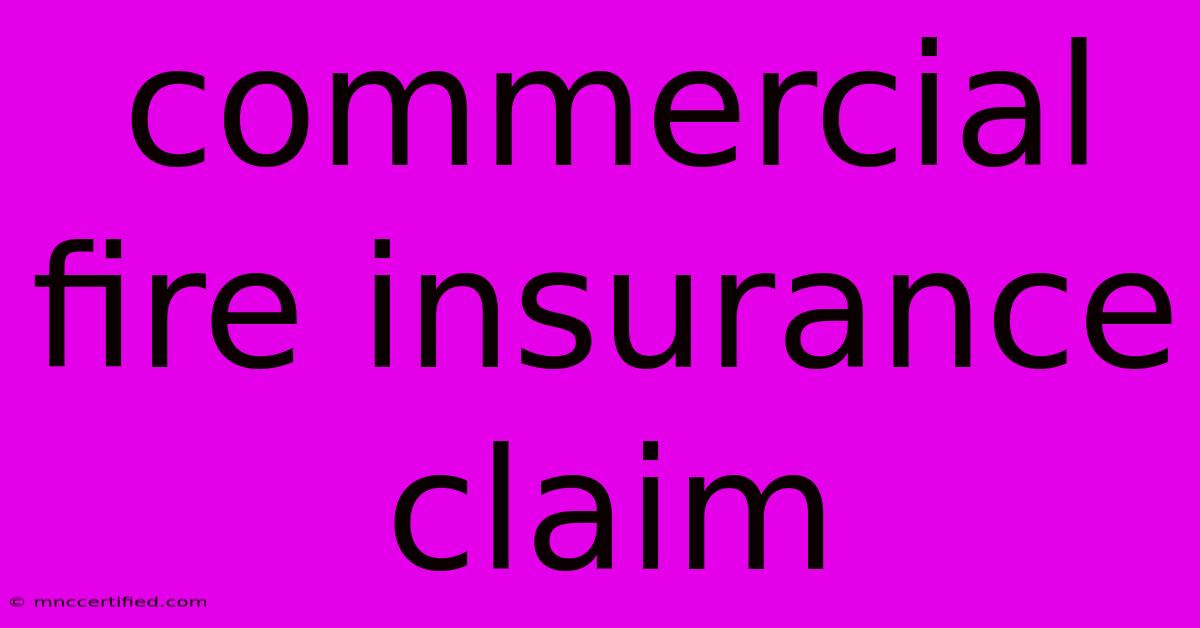Commercial Fire Insurance Claim

Table of Contents
Navigating the Complexities of a Commercial Fire Insurance Claim
Filing a commercial fire insurance claim can be a daunting process, fraught with complexities and potential pitfalls. Understanding the intricacies of your policy, gathering necessary documentation, and effectively communicating with your insurer are crucial for a successful claim. This comprehensive guide will equip you with the knowledge and strategies to navigate this challenging situation.
Understanding Your Commercial Fire Insurance Policy
Before a fire even occurs, thoroughly reviewing your commercial fire insurance policy is paramount. Key aspects to understand include:
- Coverage: What specific perils are covered? Does your policy cover fire damage, smoke damage, water damage from firefighting efforts, business interruption, and loss of income? Know your policy's limits and exclusions.
- Deductible: Understand your policy's deductible amount. This is the amount you'll be responsible for paying before your insurance coverage kicks in.
- Policy Period: Ensure your policy was active during the incident.
- Named Insured: Verify that your business is correctly named as the insured party.
- Additional Insured: If you have any additional insured parties (e.g., contractors, tenants), confirm their coverage.
Ignoring these details can significantly impact the success of your claim.
Steps to Take After a Commercial Fire
Following a fire, immediate action is critical. Here's a step-by-step guide:
- Ensure Safety: Prioritize the safety of your employees and yourself. Do not re-enter the building until it's deemed safe by fire officials.
- Contact Emergency Services: Immediately report the fire to the fire department and local authorities. Obtain a copy of the fire report. This is a crucial document for your insurance claim.
- Secure the Property: Take steps to protect the remaining undamaged property from further damage, such as covering broken windows or securing the building.
- Contact Your Insurance Company: Report the fire to your insurance company as soon as possible. Follow their instructions carefully. Many companies have a 24/7 claims hotline.
- Document the Damage: Take detailed photos and videos of the damage from various angles. This documentation will be vital evidence in supporting your claim.
- Keep Records: Maintain meticulous records of all communication with your insurance adjuster, including emails, phone calls, and letters. Keep copies of all receipts related to repairs and temporary relocation expenses.
Gathering Necessary Documentation for Your Claim
A strong claim rests upon thorough documentation. Essential documents include:
- Fire Department Report: This official report provides a detailed account of the fire's origin and extent of damage.
- Photographs and Videos: Comprehensive visual documentation of the damage is crucial.
- Inventory of Damaged Property: Create a detailed inventory of all damaged property, including descriptions, quantities, and values. Use purchase receipts, invoices, or appraisals as supporting documentation.
- Financial Records: This includes business tax returns, profit and loss statements, and bank statements to demonstrate your business's financial standing before the fire. This is especially important for claims related to business interruption.
- Building Permits and Appraisal: If applicable, provide copies of building permits and recent property appraisals.
Working with Your Insurance Adjuster
Your insurance adjuster will be your primary point of contact throughout the claims process. Maintain open and transparent communication:
- Cooperation: Fully cooperate with the adjuster's investigation. Provide all requested documentation promptly.
- Professionalism: Maintain a professional and courteous demeanor throughout the process.
- Negotiation: Be prepared to negotiate the settlement amount. If you disagree with the adjuster's assessment, seek advice from a public adjuster or legal counsel.
Business Interruption and Loss of Income Claims
Fire damage can severely disrupt your business operations, resulting in significant loss of income. Understanding your policy's business interruption coverage is essential.
- Documentation: Meticulously document your lost income, including sales records, contracts, and projected revenue.
- Mitigation: Take steps to minimize the disruption to your business. This could involve finding temporary workspace or utilizing alternative methods to continue operating.
When to Seek Professional Help
Navigating a commercial fire insurance claim can be challenging. Consider seeking professional help if:
- You are overwhelmed by the process.
- You disagree with the adjuster's assessment.
- Your claim is complex or involves significant losses.
- You suspect foul play or insurance fraud.
A public adjuster or attorney specializing in insurance claims can provide invaluable assistance. They can help you understand your policy, gather necessary documentation, and negotiate a fair settlement. Remember, proactively managing your commercial fire insurance claim is crucial to ensuring a swift and satisfactory resolution. Don't hesitate to seek expert guidance when needed.

Thank you for visiting our website wich cover about Commercial Fire Insurance Claim. We hope the information provided has been useful to you. Feel free to contact us if you have any questions or need further assistance. See you next time and dont miss to bookmark.
Featured Posts
-
Michigan Vs Northwestern 2024 Game Preview
Nov 24, 2024
-
Does Insurance Cover Slab Leaks
Nov 24, 2024
-
Spurs 4 0 Win Over Manchester City
Nov 24, 2024
-
Rangers Draw 1 1 Vs Dundee United
Nov 24, 2024
-
Winnett Insurance Inc Joplin Mo
Nov 24, 2024